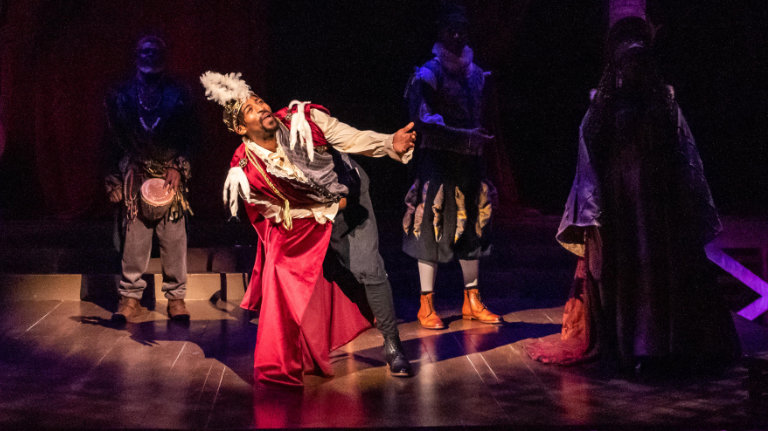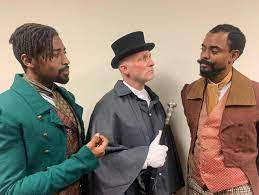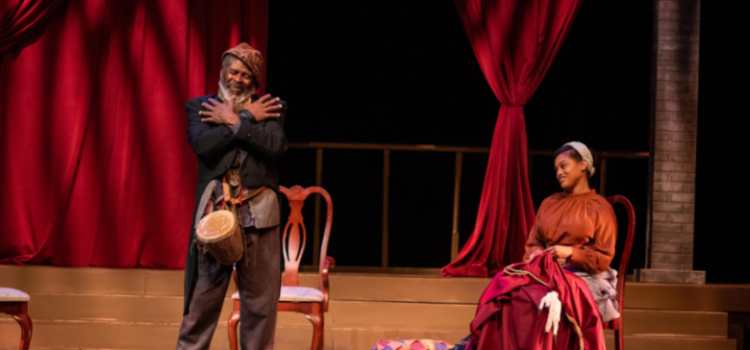By Lynn Venhaus
Bigotry is an ugly thing to witness, even in the context of 1821. It’s expected, but always unsettling, no matter what period.
So, when the first scene of “The African Company Presents Richard III” opens with a condescending and arrogant white supremist shutting down a competing Shakespearean production, that sets the tone for a battle between right and might.
As Stephen Price, the haughty and cruel producer at the Park Theatre, Eric Dean White will make your skin crawl. He is threatened by their success and will use his influence to get the powers-at-be to make it hard on them.
While our sympathies lie with the performers in The African Company, they are having their own conflicts to deal with from within that threatens their existence too.
This 1994 play within a play by Carlyle Brown is a provocative showcase for compelling artists in The Black Rep’s latest riveting work. And opens the Black Rep’s 46th season in fine fashion.
Based on a true story, Brown’s drama is set in pre-Civil War New York when two productions of Shakespeare’s “Richard III” are vying for audiences. Slavery was not outlawed yet, but there were more free blacks living there.
Shakespeare famously said, “The play is the thing,” and The African Company, through the Black Rep’s hard-hitting production, shows you why art can break barriers, and all the challenges are worth it.

The first black theatre in the U.S., The African Company of New York was a downtown theater growing in popularity with not only black audiences, but white audiences too. Their satires drew crowds, particularly when it was about the status quo white society. And the unenlightened were outraged those blacks had a voice. How dare they tackle the Shakespeare and other British classics!
William Henry “Billy” Brown had turned his home’s backyard into The African Grove, where blacks could socialize as society became increasingly segregated, then he expanded to theater, founding The African Company.
Price’s company has paid a renowned British actor, Junius Brutus Booth (father of John Wilkes Booth), a pretty penny and a sweet contract promising a full house, so they want a return on the investment, more revenue, and will not play nice.
The black theater doesn’t have the luxuries afforded the other theater, and most of the actors work as domestic servants or as laborers or in other roles.
“We all charade one great role of the happy, obedient Negro,” says character James Hewlett, the first black Shakespearean actor in U.S., and is playing the lead role.
Some of the cast is worried about the police shutting them down. What if they are taken to jail?
Director Ron Himes keeps the tension simmering both in racial friction and the tussling actors. He ensures that the company’s commitment to art is a focal point, while he laces this distinctive history lesson with humor and music.
As Hewlett, Cameron Jamarr Davis is passionate about the work, and doubles-down on his conviction, despite mounting odds – and a complicated romantic entanglement.
Ann Johnson, the actress playing Lady Anne, is exhausted by her day job and feelings that don’t seem to be reciprocated in equal measure. She is confused by the part and the play’s action, and not afraid to say so. Coda Boyce gives a fierce performance as someone speaking up for herself, and not compromising in a world that expects her to be subservient.
Alex Jay is a strong Sarah, who tries to keep things going smoothly, and is an accomplished seamstress. Costume designer Andre Harrington has beautifully captured the period and the royal costumes.
Olajuwon Davis is tough and tenacious in his portrayal as the dedicated, steadfast promoter Brown, who tries to not let what he calls “silly” views of white people grind him down. He channels his anger into action.
In real life, Brown wrote “The Drama of King Shotaway,” which is considered the first play by an African American and was about the black Caribbean war of 1796 against white settlers. Somehow, it’s been lost. However, what he did for blacks in theater will never be forgotten.
Papa Shakespeare is trying hard to keep them together. He’s quite a storyteller, a repository of history and wisdom – and colorful, as played by Wali Jamal Abdull. As the racist constable, Dustin Petrillo is a despicable meanie.
The simple set, designed by Jamie Bullins, doubles as a rehearsal hall and a theatrical stage, well-accented by Jasmine Williams’ lighting design.
This well-acted, well-staged play is a noteworthy moment in time that will resonate with modern audiences, for its power is timeless.

The Black Rep presents “The African Company Presents Richard III” Sept. through Sept. 25 at the Edison Theatre on the campus of Washington University. For more information, visit www.theblackrep.org
Photos by Phillip Hamer

Lynn (Zipfel) Venhaus has had a continuous byline in St. Louis metro region publications since 1978. She writes features and news for Belleville News-Democrat and contributes to St. Louis magazine and other publications.
She is a Rotten Tomatoes-approved film critic, currently reviews films for Webster-Kirkwood Times and KTRS Radio, covers entertainment for PopLifeSTL.com and co-hosts podcast PopLifeSTL.com…Presents.
She is a member of Critics Choice Association, where she serves on the women’s and marketing committees; Alliance of Women Film Journalists; and on the board of the St. Louis Film Critics Association. She is a founding and board member of the St. Louis Theater Circle.
She is retired from teaching journalism/media as an adjunct college instructor.



